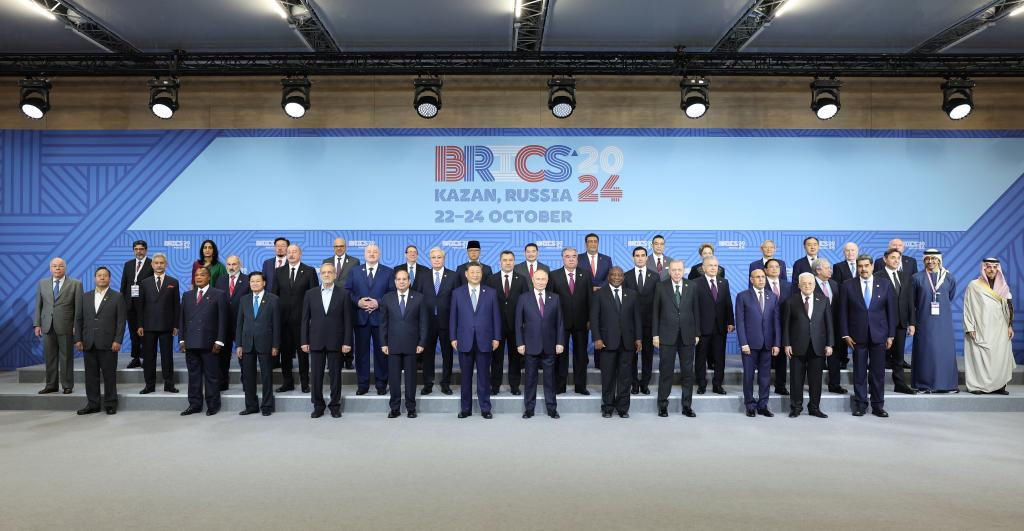
Chinese President Xi Jinping poses for a group photo with other leaders and representatives attending the BRICS Plus leaders' dialogue in Kazan, Russia, October 24, 2024. [Photo/Xinhua]
Editor's note: CGTN's First Voice provides instant commentary on breaking stories. The column clarifies emerging issues and better defines the news agenda, offering a Chinese perspective on the latest global events.
"The collective rise of the Global South is a distinctive feature of the great transformation across the world," Chinese President Xi Jinping said at the BRICS Plus leaders' dialogue on Thursday.
With the historic expansion this year, BRICS now represents nearly half of the global population and around 30 percent of the world's GDP, demonstrating the expanding economic power and political prominence of Global South countries.
Against the backdrop of global financial instability, geopolitical tensions and civilizational divisions, greater BRICS cooperation is vital to address global challenges.
China is not only an advocate of BRICS cooperation, but also a contributor to common security, common prosperity and harmony among Global South countries.
China initiated the BRICS Plus cooperation model, promoted the establishment of the BRICS New Development Bank, and put forward a series of proposals, injecting new impetus into greater BRICS cooperation.
The China-proposed Global Security Initiative (GSI), Global Development Initiative (GDI) and Global Civilization Initiative (GCI) have been warmly received by the Global South.
"We should come forward together to form a stabilizing force for peace," Xi said at the BRICS Plus leaders' dialogue.
He also reminded the meeting that the different Palestinian factions had met in Beijing in July and reconciled under China's mediation, which was a key step towards peace in the Middle East.
Development is another keyword in greater BRICS cooperation. Xi said the Global South "emerges for development and prospers through development." BRICS has become an alternative for developing countries whose development rights have long been overlooked in the U.S.-dominated economic order.
The GDI, first proposed by Xi in 2021, has helped make available nearly $20 billion of development fund and launch more than 1,100 projects. The China-BRICS AI Development and Cooperation Center, the World Smart Customs Community Portal, and the BRICS Customs Center of Excellence will also mean shared development opportunities and optimized resource allocation among the Global South.
Joseph Matthews, a senior professor at the BELTEI International University in Phnom Penh, Cambodia, said BRICS has "also staunchly defended multilateralism and the free trade system while calling for reforms in global governance to amplify the voices of emerging markets and developing countries."
China is also dedicated to promoting the development of all civilizations. "We should enhance communication and dialogue, and support each other in taking the path to modernization suited to our respective national conditions," Xi said.
The GCI's objective is ensuring harmony among all civilizations and under the initiative, people-to-people exchanges are in full swing among BRICS countries. For instance, the first special session of the International Youth Poetry Festival for BRICS countries was held in Hangzhou in east China in July, attended by 72 poets.
Xi announced at the BRICS Plus dialogue that China will also coordinate with others to form a Global South Think Tanks Alliance to promote people-to-people exchanges and experience-sharing in governance.
His speech demonstrates China's sincerity and determination in working with all other BRICS countries to open a new horizon in the high-quality development of greater BRICS cooperation. The GSI, GDI and GCI have effectively combined the strength of the Global South to build a community with a shared future for all, and this explains the vitality and popularity of BRICS.

 中文
中文



